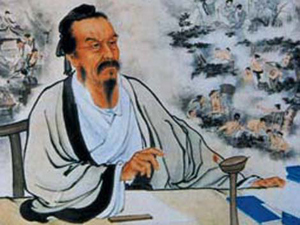Written by: Yao Dan
Posted on: March 18, 2014 |  | 中文
| 中文
Outlaws of the Marsh
Historic stories and stories about heroes' fights during the Song Dynasty gave birth to a chapter-titled fiction Outlaws of the Marsh, authored by Shi Nai'an (whose dates of birth and death remain unknown, c. 1296-1370), written in a time very close to the completion of Romance of the Three Kingdoms.
Most of the characters in the story gathered in Liangshan Marsh, a place of "saddle world" ("jiang hu"), outside the ordinary people's daily life. Readers of one generation after another took these characters as heroes simply because they hold a banner of "acting in the name of heaven." Lu Zhishen and Wu Song, two of the aforementioned characters, help the weak to muster out of difficulties. They, together with other characters in the novel, live a a luxurious life, eating and drinking exuberantly, in short leading a life which ordinary people long for. Meanwhile, life in a "saddle world" has no room for a family. The friendship among men described in the novel is moving, able to stand the test of all adversities.
The plots of the novel explored in different chaptersare highly dramatic and attractive as the title of the chapter suggest, for example "Wu Song, drunk, beats Gate Guard Jiang," "capture birthday gifts by a ruse," "sagacious Lu makes a shambles of Wild Boar Forest," "Lin Chong shelters from snowstorm in the mountain," "Wu Song kills a tiger with bare hands," "blood pool in the Mandarin Duck Tavern," "three attacks at the Zhu Family Manor". All these chapters are full of thrill and suspense. Fairly simple in structure, the story evolves along a single thread primarily around one character, and the chapters are all related in some way or the other to him. If all the chapters are stringed together, it would make a fine biographical sketch for the protagonist and can even pass as an independent story.
The characters in the novel come from varied backgrounds, ranging from landed gentry to bandits, from officials of high position to vagrants. They all however eventually gather in mountains with a sense of acting in the name of heaven and also a strong material desire. They fear "neither heaven, earth nor the court, sharing gold and silver together and clad in rare silk, eat meat and drink wine to their fill." They take actions to uphold justice yet they also kill people indiscriminately. For instance, in the part "blood pool in the Mandarin Duck Tavern," Wu Song kills fifteen before he stops, even though only three of them are his enemies. Another character, Li Kui, in the chapter"snatch a victim from the execution ground," chops many people to death with his "two axes flying up and down." Some scholars who influenced are influenced by the Westtake this as an indifference to human lives. For a contemporary scholar, this view is not without warrant. But if we take into consideration the source and the time of the novel, along with the storytellers' promptbooks, we may ascribe these bloody descriptions to a purpose which was to cater for a "blood lust" by listeners, a common strategy of storytellers meant to grab attention. The blood lust is probably a universal nature of human beings that began from the very beginning with Abel and CAin. We have seen the trace of this lust in Decameron, Gargantua and Pantagruel and also in the terrifying movies of today.
 |
Shi Nai'an |
As a scholar, while adapting the novel from popular stories at that time, Shi Nai'an could not help embedding in the stories his personal feelings and values. His character, Luo Guanzhong, emphasizes orthodox Han thinking, whereas Shi Nai'an, another character, sees a scholars' dream to "establish exploits.", His characters only do things in the name of heaven, and never tyr to take on against the supreme power, "the heaven." All these characters ask for is to be accepted by the "heaven", and to be able serve it. In the end, after pledging submission to the court and being granted amnesty, these characters led by the main protagonist Song Jiang set themselves off to make rebellions. This ending mirrors the author's longing for achieving exploits for the court. This is the reason why during the "cultural revolution" in China in 1970s, some critics denounced the novel as a “rebellion-surrender” story only against the corrupt officials, but not against the supreme ruler—the emperor. This denouncement is probably fair However the author's dream didn't last long, as all the characters in the book eventually expire, leaving later generations to pass their own judgment.
You may also like: